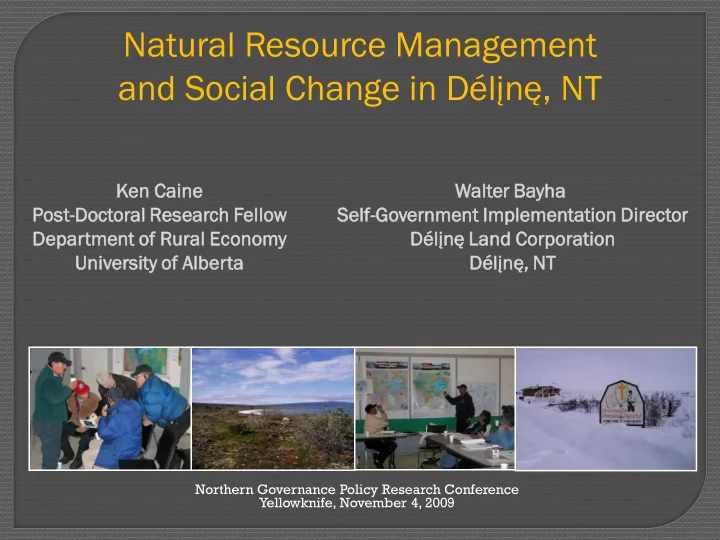

Natural Resource Management and Social Change in Délįnę, NT Ken Caine Walter Bayha Post-Doct octor oral l Re Resea earch h Fellow ow Self-Gover ernm nment ent Implementa entation on Director or Department nt of Rural Economy Délįnę Land Corporation Univer ersit ity of Alberta Délįnę, NT Northern Governance Policy Research Conference Yellowknife, November 4, 2009
Co-management in the Sahtu Dél į n ę & Great Bear Lake Great Bear Lake Watershed Management Plan Saoyú- ʔ ehdacho National Historic Site Sahtu Land Use Plan Process Policy Implications
1986-2001 GBL Advisory Committee 2000 DIAND/ DFN 2001 Issues Paper Oct 2002 GBLWG Oct 2003 Framework Jan 2004 Water Heart story May 2005 GBLWMP Cultural & Ecological Integrity Process In SLUP present 2006-
1996 National Historic Site 1999 NWT PAS 2000 CIS & 5 yr withdrawal 2000-2006 NWT-PAS Resource Assessments 2005 Withdrawal extension Mar 2007 $5 M & $700K/yr Board” Management Ɂ ehdacho “ Saoyú and
Elder’s stories lay the groundwork for the way that the GBL watershed will be managed. Telling of stories and their use in directing each section of the plan provided connection between commonly misunderstood or mis-communicated worldviews. GBLMP based on guiding principles as well as a more technical ecological and cultural research and monitoring plan.
Perceived success of formally using oral traditions and Dene language Dél į n ę approached Parks Canada Decision by DFO to provide a community boat Facilitators comfortable working in both Dene and western science traditions
“you know we‟re really at a community crisis level with them over this whole thing because they‟ve lost when we were supposed to release these terms of reference of what we were going to do…we pissed away for a whole year here and when they see this, they‟re gonna go „What did you hold this for a year for?‟…you lose, I find the organization loses credibility, and then you end up wearing some of that.” Potential for conflict, but at later stages Progress made toward consensus on issue Conventional planning process Progress Cultural Difference in expectations in planning similar time frame process 0 “working through the flat spot” Time taken for consensus Time on issue Potential for conflict, but learning and innovation “Well I think people come increasingly to understand each other and they furthermore come increasingly to influence each other so that the culture of the table is formed and they learn from each other”
• Power of historical agreements and “formal obligations” (symbolic capital) • Land Claim Agreement – source of power used to access other sources of power
Relational Co-management • Socially embedded process rather than separate, ENGO deliberate and transparent Government of Canada Influence of managerial activities Non-government Organizations Relational • Connections Healthy and necessary Water relationship between social Heart learning-trust & power, Government of knowledge, and engagement: Délįne First NWT Nation “Practical Understanding” Broader CPAWS Organizational Policies
Co-management is not a fixed process - does not have to follow any one model or style / needs to be flexible Traditional stories are very valuable to planning processes that try to incorporate indigenous culture Understanding one another is not enough when local people work with outside people – engagement, understanding, and power Much more time is needed in early meetings and workshops to learn about one another on a more personal level GBLMP & S-E as cultural models or way of doing things toward community-driven planning
Walter Bayha Ken Caine Dél į n ę Land Corporation Department of Rural Economy Dél į n ę , NT University of Alberta Email: sgi_director@gov.deline.nt Edmonton, Canada Email: kcaine@ualberta.ca
Recommend
More recommend